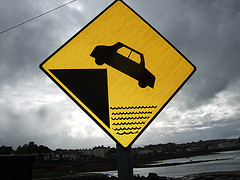I’m a futurist. Or so Karen tells me.
She first coined this particular label for me about two weeks ago, as I recall. She mentioned it during a conversation in which I declared cable television to be an antiquated dinosaur in which few people are actually interested (somehow, when I write that out, it makes me sound like such a snob…). In any case, she used the term in the sense that I readily accept, see the positives in, and embrace changes that alter (positively, in my perception) the human lifestyle, particularly of a technological nature.
That said, what I’ve read and heard about Google’s Glass project makes me a bit uncomfortable.
This afternoon, the three of us went out for a late lunch. I took out my phone to check Twitter, and Karen announced that I had “disengaged.” I became defensive for a moment, but it troubles me that even that briefest of seconds can be just that: disengaging from those around me.
In whatever instance, though, using my phone does disengage me, because I am no longer fully present with the people around me. I attempt to limit this. I intentionally avoid push notifications, at least noisy ones, whenever possible, so that incoming emails and notifications are visible on my screen when I choose to check my phone, but don’t interrupt what I’m doing to grab my attention. I want to see my information when I want to see it…I don’t want it interrupting what I’m doing to tell me when to look at it. I have the luxury of arranging these options on my phone, so that, incoming calls or texts aside, I choose when to look at the device.
Having incoming messages, my Twitter stream, and other “noisy” data appearing as a heads-up display on my sunglasses as I walk down the street? I’ll pass.
There’s a bigger concern, here, though, and that’s the change in the social contract that this sort of technology brings about. I can choose to control or avoid it altogether as far as my usage is concerned, but I cannot control yours. So, if I’m walking down the street and pass someone wearing cyborg glasses that are streaming his point-of-view to YouTube, then I have appeared on YouTube without consenting to do so. When a guy is walking through the parking lot of our apartment complex wearing these glasses, and passes an attractive woman leaving the pool in her bikini, he has a recording of her to consult later as he will. In fact, not only does he have that image, but so does Google, whose motives occasionally raise doubts for me.
Now, legally, I’m not certain how much the law pertains to this, because it hasn’t really caught up with technological trends as of yet. To my knowledge, there is no expectation of privacy in a public space…thus, we can all be recorded by traffic cameras. What about the dinner party we host, however? Do I have the right to ask someone to not use such a device in my home? Even in a public space, I would hope to have some level of control over when and how my likeness is used by my friends.
I make an earnest effort to not post photos of friends without their permission, even at casual events. I have many friends who do the same, and I can think of a handful that prefer to not have their likenesses posted. Perhaps the issue in my mind is one of ethics moreso than legality.
Which raises interesting questions about how these sorts of technological advancements impact our ethics.
The world is moving quickly. This only becomes dystopian if it leaves us behind.
Photo Attribution: azugaldia under Creative Commons



